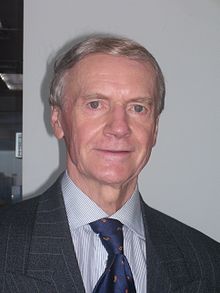
Andrei Andreyevich Gromyko was a Soviet politician and diplomat during the Cold War. He served as Minister of Foreign Affairs (1957–1985) and as Chairman of the Presidium of the Supreme Soviet (1985–1988). Gromyko was responsible for many top decisions on Soviet foreign policy until he retired in 1988. In the 1940s Western pundits called him Mr Nyet or "Grim Grom", because of his frequent use of the Soviet veto in the United Nations Security Council.

"We will bury you" is a phrase that was used by Soviet First Secretary Nikita Khrushchev, the de facto ruler of the USSR, while addressing Western ambassadors at a reception at the Polish embassy in Moscow on November 18, 1956. The phrase was originally translated into English by Khrushchev's personal interpreter Viktor Sukhodrev. The phrase was received very negatively by contemporary Western audiences, but modern translators have suggested the phrase was mistranslated.

Pavel PalazhchenkoorPalazchenko is a former high-level Soviet conference interpreter who was the chief English interpreter for Mikhail Gorbachev and Soviet foreign minister Eduard Shevardnadze from 1985 and 1991.

The Malta Summit was a meeting between United States President George H. W. Bush and Soviet General Secretary Mikhail Gorbachev on December 2–3, 1989, just a few weeks after the fall of the Berlin Wall. It followed a meeting that included Ronald Reagan in New York in December 1988. During the summit, Bush and Gorbachev declared an end to the Cold War, although whether it was truly such is a matter of debate. News reports of the time referred to the Malta Summit as one of the most important since World War II, when British prime minister Winston Churchill, Soviet General Secretary Joseph Stalin and US President Franklin D. Roosevelt agreed on a post-war plan for Europe at the Yalta Conference.

Jack Foust Matlock Jr. is an American former ambassador, career Foreign Service Officer, a teacher, a historian, and a linguist. He was a specialist in Soviet affairs during some of the most tumultuous years of the Cold War, and served as the U.S. Ambassador to the Soviet Union from 1987 to 1991.

Relations between the Soviet Union and the United States were fully established in 1933 as the succeeding bilateral ties to those between the Russian Empire and the United States, which lasted from 1776 until 1917; they were also the predecessor to the current bilateral ties between the Russian Federation and the United States that began in 1992 after the end of the Cold War. The relationship between the Soviet Union and the United States was largely defined by mistrust and tense hostility. The invasion of the Soviet Union by Germany as well as the attack on the U.S. Pacific Fleet at Pearl Harbor by Imperial Japan marked the Soviet and American entries into World War II on the side of the Allies in June and December 1941, respectively. As the Soviet–American alliance against the Axis came to an end following the Allied victory in 1945, the first signs of post-war mistrust and hostility began to immediately appear between the two countries, as the Soviet Union militarily occupied Eastern European countries and turned them into satellite states, forming the Eastern Bloc. These bilateral tensions escalated into the Cold War, a decades-long period of tense hostile relations with short phases of détente that ended after the collapse of the Soviet Union and emergence of the present-day Russian Federation at the end of 1991.
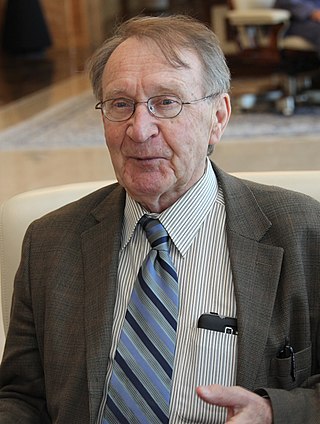
Roald Zinnurovich Sagdeev is a Russian expert in plasma physics and a former director of the Space Research Institute of the USSR Academy of Sciences. He was also a science advisor to the Soviet President Mikhail Gorbachev. Sagdeev graduated from Moscow State University. He is a member of both the Russian Academy of Sciences and the American Philosophical Society. He has worked at the University of Maryland, College Park since 1989 in the University of Maryland College of Computer, Mathematical, and Natural Sciences. He is also currently a senior advisor at the Albright Stonebridge Group, a global strategy firm, where he assists clients with issues involving Russia and countries in the former Soviet Union. Sagdeev was married to, and divorced from, Susan Eisenhower, granddaughter of Dwight D. Eisenhower. Sagdeev was the recipient of the 2003 Carl Sagan Memorial Award, and the James Clerk Maxwell Prize for Plasma Physics (2001).

The United Nations Interpretation Service is a part of the Meetings and Publishing Division (MPD) of the UN's Department for General Assembly and Conference Management (DGACM). Its core function is to provide interpretation from and into Arabic, Chinese, English, French, Russian and Spanish for meetings held at United Nations Headquarters, and those at other locations which the department is responsible for servicing. Interpretation is essential to the inter-governmental bodies for the proper conduct and smooth functioning of their deliberations.
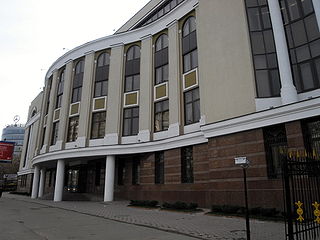
The Gorbachev Foundation is a non-profit organization headquartered in Moscow, founded by the former Soviet leader Mikhail Gorbachev in December 1991 and began its work in January 1992. The foundation researches the Perestroika era, as well as issues of Russian history and politics. It was financed by Gorbachev and donations by people and companies.
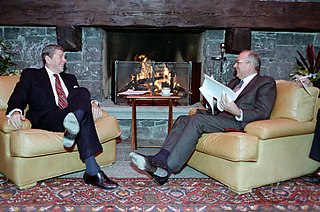
The Geneva Summit of 1985 was a Cold War-era meeting in Geneva, Switzerland. It was held on November 19 and 20, 1985, between U.S. President Ronald Reagan and Soviet General Secretary Mikhail Gorbachev. The two leaders met for the first time to hold talks on international diplomatic relations and the arms race.
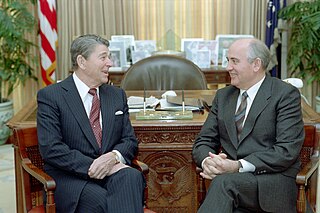
The Washington Summit of 1987 was a Cold War-era meeting between United States president Ronald Reagan and General Secretary of the Communist Party of the Soviet Union Mikhail Gorbachev that took place on December 8–10. Reagan and Gorbachev discussed regional conflicts in Afghanistan, Central America, and Southern Africa, arms control issues for chemical weapons as well as conventional weapons, the status of START negotiations, and human rights. A notable accomplishment of the Washington Summit was the signing of the Intermediate-Range Nuclear Forces (INF) Treaty.
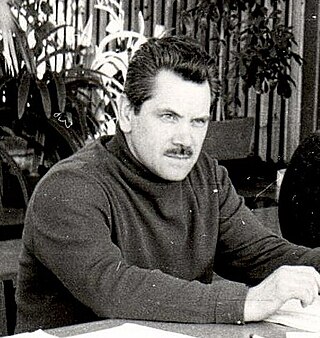
Anatoly Sergeevich Chernyaev was a Russian politician and writer, member of the Central Committee of the Communist Party of the USSR, who became foreign-policy advisor to General Secretary Mikhail Gorbachev in 1986-1991.

The term Big Four Conference may refer to one of several conferences between heads of state or foreign ministers of the victorious nations after World War I (1914–18) or during and after World War II (1939–45).
On 7 January 1989, Ruhollah Khomeini, supreme leader of Iran, sent a letter to Mikhail Gorbachev, the General Secretary of the Soviet Union. This letter was Khomeini's only written message to a foreign leader. Khomeini's letter was delivered by the Iranian politicians Abdollah Javadi-Amoli, Mohammad-Javad Larijani, and Marzieh Hadidchi. In the letter, Khomeini declared that communism was dissolving within the Soviet bloc, and invited Gorbachev to consider Islam as an alternative to communist ideology.
Vladimir Fyodorovich Petrovsky was a Soviet and Russian diplomat, ambassador, professor in history, politician and writer.
The four-day Sino-Soviet Summit was held in Beijing from 15-18 May 1989. This would be the first formal meeting between a Soviet Communist leader and a Chinese Communist leader since the Sino-Soviet split in the 1950s. The last Soviet leader to visit China was Nikita Khrushchev in September 1959. Both Deng Xiaoping, the paramount leader of China, and Mikhail Gorbachev, General Secretary of the Communist Party of the Soviet Union, proclaimed that the summit was the beginning of normalized state-to-state relations. The meeting between Mikhail Gorbachev and then General Secretary of the Chinese Communist Party (CCP), Zhao Ziyang, was hailed as the "natural restoration" of party-to-party relations.
George H. W. Bush, whose term as president lasted from 1989 until 1993, had extensive experience with US foreign policy. Unlike his predecessor, Ronald Reagan, he downplayed vision and emphasized caution and careful management. He had quietly disagreed with many of Reagan's foreign policy decisions and tried to build his own policies. His main foreign policy advisors were Secretaries of State James Baker, a longtime friend, and National Security Advisor Brent Scowcroft. Key geopolitical events that occurred during Bush's presidency were:

The Helsinki Summit was a private, bilateral meeting between American President George H. W. Bush and Soviet President Mikhail Gorbachev that took place in Helsinki, Finland on September 9, 1990. Due to the vested interests of both the Soviet Union and the United States in the Gulf Crisis' resolution, August 1990 Iraqi invasion of Kuwait was the primary topic of discussion for the leaders during the Helsinki Summit. The concerted efforts at easing American-Soviet tensions in the aftermath of the Cold War was another prominent topic, among other notable current events. At the summit's conclusion, Presidents Bush and Gorbachev produced a document of joint statements that illuminated the areas in which the leaders had committed to aligning their foreign policy goals. The summit was followed by a press conference wherein members of the media questioned Presidents Bush and Gorbachev about the content of their meeting and the justifications for their joint statements.

The controversy in Russia regarding the legitimacy of eastward NATO expansion relates to the aftermath of the Revolutions of 1989, when the fall of Soviet-allied communist states to opposition parties brought European spheres of influence into question. The Russian authorities claim that agreement on non-expansion of NATO to Eastern Europe took place orally and the alliance violated it with its expansion while the leaders of the alliance claim that no such promise was made and that such a decision could only be made in writing. Soviet President Mikhail Gorbachev, who participated in the 1990 negotiations, subsequently spoke out about the existence of a "guarantee of non-expansion of NATO to the east" inconsistently, confirming its existence in some interviews and refuting in others. Among academic researchers, opinions on the existence or absence of a non-extension agreement also differ.

The Washington Summit of 1990, also known as the "Two Plus Four" talks, was an international summit in the history of the Cold War in which the United States and Germany gained the Soviet Union's support for the reunification of Germany by agreeing that NATO needed to be reformed. As part of this effort, US President George H. W. Bush called for a NATO summit to reform the organization and demonstrate NATO's willingness to present a different approach to the Soviet Union. As part of his efforts to improve relations between the United States and the Soviet Union, Bush proposed a bilateral summit in Washington to Soviet Union President Mikhail Gorbachev, in addition to the NATO summit. Gorbachev agreed to the proposal, which resulted in the Washington Summit of 1990.
